Pastor's Message - Feast of the Exaltation of the Holy Cross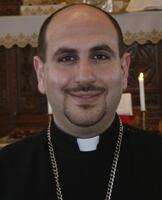 On Sunday, September 12, the people of the Armenian Apostolic Church celebrated with great joy and solemnity the Feast of the Exaltation of the Holy Cross. Much has been said and much has been written about the cross since the time of our Lord. It is the central symbol of our Christian faith, the one that is most recognizable to those outside the Church and the most appealing to those within. The Armenian people throughout the centuries have been particularly attached to the cross and the conviction of hope, promise of redemption and reminder of God’s compassionate love that it brings. This has been especially true during the many eras of persecution and turmoil that have been endured by our Church and Nation. Both individually and collectively, to countless generations of believers the cross has been a visual reminder of spiritual encouragement during the triumphs and tribulations of human life in this world. 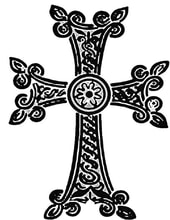 Many have asked, “why the cross?” Or even, “how did it work?” Or still, “Couldn’t there have been another way?” This last one seems to be the age-old question that seems to return perennially in one form or another. “Couldn’t there have been another way?” “When God wanted to redeem the world through his Son, why did it have to be through the cross? Could there have been some less grotesque and more convivial way for the Son of God save the earth from sin, other than the brutality of the cross?” This is, of course, a gargantuan question for which to try to come up with an answer, one that has been studied and written about exhaustively, for which we would need hours and hours of instructing to even begin to uncover. Suffice it to say that the short answer is “no.” No. There was no other way besides suffering and dying by which Our Lord could relay satisfactorily the exact message that God was to impart on humanity. This message is precisely that:
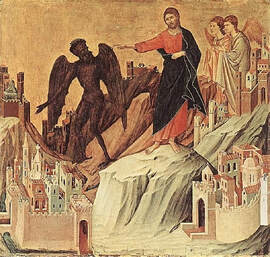 But we should mention that we have encountered these three truths in the Gospels before, and more particularly in the temptation of Jesus to forgo these things and to try to find “another way.” The Gospels record how, following his baptism in the Jordan River, Jesus was taken into the wilderness to fast and to be tested. Once he had fasted completely for forty days, Satan himself came to try to tempt him into renouncing these three things. First, he charged him to turn some stones into bread in order to abate his hunger. Jesus refused, quoting scripture “man does not live by bread alone, but by every word that comes from the mouth of God.” Next, he tells Jesus to throw himself down from the high pinnacle of the Temple in Jerusalem, claiming that God will send his legions of angels to rescue him. Jesus again refutes Satan, reminding him “You shall not put the Lord God to the test.” Finally, Satan takes Jesus to the summit of a very high mountain, showing him all the kingdoms and riches of the world, promising “all this I will give to you if you worship me.” In one last feat of strength, Jesus says, “Away from me, Satan! You shall worship only God alone!” The great Archbishop Fulton Sheen, of blessed memory, one of the most magnificent theologians and evangelists of modern times, writes a fascinating bit of scriptural commentary on this Gospel passage, which is contained in his book, “Life of Christ,” originally published in 1958. 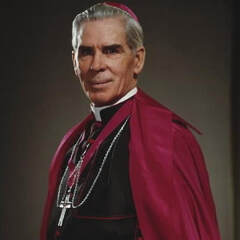 Archbishop Fulton Sheen (1895-1974) Archbishop Fulton Sheen (1895-1974) In speaking of Jesus’s first temptation to turn stones into bread in order to satisfy his hunger, he writes, “Our Lord would not use miraculous powers to provide food for himself, as he would not use miraculous powers, later on, to come down from the Cross…” The reason for this is that Jesus was asserting that what’s more important than feeding one’s self – or the hungry of the world – is that they receive the spiritual nourishment from God. In Archbishop Sheen’s interpretation, Jesus was saying to Satan, “You are tempting me away from my cross, suggesting that I be a cheap leader of people, filling their bellies instead of their souls… you would have me bring outer abundance instead of inner holiness. If I give bread alone, then man is no more than an animal… those who believe in me must hold to that faith, even when they are starved and weak, even when they are imprisoned and scourged.” Indeed, the cross shows Jesus starved and weak, imprisoned and scourged, and yet he remained steadfast in his belief that God would sustain and strengthen him, more than any relief brought by food or respite from suffering. “The second temptation, “Sheen writes, “was to forget the cross and replace it with an effortless display of power, which would make it easy for everyone to believe in him. If our Lord really trusted so much in the Father, he should prove it by doing a daring deed and giving the Father an opportunity to protect him.” But Archbishop Sheen points out two things: 1) “Faith in God must never contradict reason,” and 2) “If he did show such signs, he would certainly have all men running after him; but what would it profit them if sin was still on their souls?” To this he adds, referring to the cross, “It is only when I am seen on the cross that I really draw men to myself; it is by sacrifice, and not by marvels, that I must make my appeal… I must win followers not with material power, but with love.” He also reminds us that Jesus wants “men who will believe in me, even when I do not protect them… I want my missionaries and martyrs to love me in prison and death as I loved them in my own suffering.” In speaking of the final temptation of Jesus to reign over all the kingdoms of the world in exchange for bowing down to Satan, the blessed Archbishop writes, “Satan was lying in order to tempt our Lord again from the cross, by way of a short cut… inasmuch as the kingdom of this world was under the power of sin (and indeed Jesus even referred to Satan elsewhere as the “prince of this world”), even the new Kingdom which our Lord would establish – if inherited from Satan -- must be only a continuation of the old one. In short, he could have the earth, provided he promised not to change it. He could have mankind, as long as he promised not to redeem it… the kingdom that Satan offered was of the world, not of the Spirit. It would still be a kingdom of evil and the hearts of his subjects would not be regenerated.” Satan was in effect saying, “Forget your cross, your kingdom of heaven. If you want the world, it is at your feet.” But our Lord knew that these kingdoms could only be won by his suffering and death. Indeed, in all three of these examples, Jesus shows us how his death on the cross is going to have way more power and impact than anything Satan or his fallen world, or any kind of substitute power – that doesn’t involve suffering and self-sacrifice – could offer him. And not only that, his own association with suffering, pain, sorrow and death helps us to make sense of those things as we deal with them in our own lives, and encourages us to undertake those things with joy and thanksgiving to God, knowing that we lived in humility for others and not to serve our own selfish interests. Through his temptations at the beginning of his ministry and his crucifixion at the end, Jesus came to show us precisely that our life is not about filling our bellies and our egos and our pockets. But rather, by emptying himself – and ourselves – we find true nourishment in God, true power in our identity as his followers and true wealth, not in any kingdoms of the world, but in the eternal heavenly Kingdom, which he promised to his beloved ones. 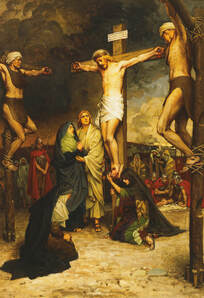 This, dearly beloved, is the true message that the Cross is speaking to us today and at all times. Jesus faced one last temptation to turn away from the path God’s will had for him and go after his own inclinations – while he was on the cross, the Roman soldiers, using the same qualifier as Satan himself, “If you are the Son of God…,” tempted him to come down from the cross. The thief on the cross next to him goaded, “aren’t you the Messiah, save yourself and us!” The crowds that had gathered mocked him and said, “he saved others; let him save himself if he is the Messiah!” He has the power! Let him walk away from this madness! Let him prove that he is in control! He had one last chance to walk away, but he didn’t. He didn’t want to become a cheap idol – all talk and no action, so to speak! Our Lord showed his power by totally emptying himself and dying on the cross, so that you and me would be redeemed, sanctified and raised to eternal life. There simply was no other way. The immense measure of love shown in the willing self-sacrifice of Jesus Christ our Lord is what today shows us the true power of the Holy Cross. Fr. Stephan Baljian, Pastor Feast of the Exaltation of the Holy Cross September 2021
0 Comments
Leave a Reply. |
Archives
May 2024
Categories |
Location |
SEARCH
Contact Us |

 RSS Feed
RSS Feed